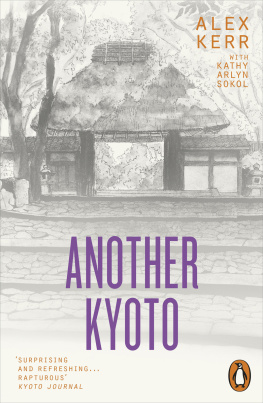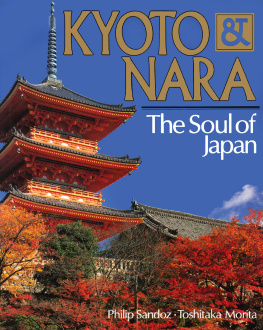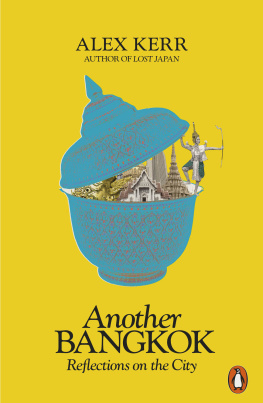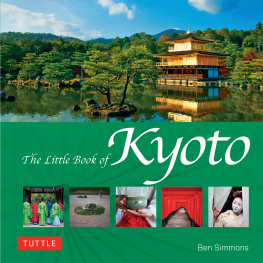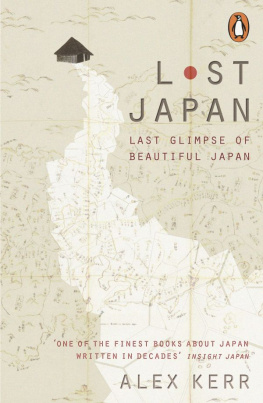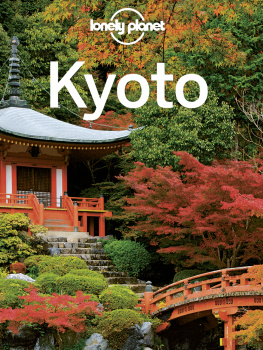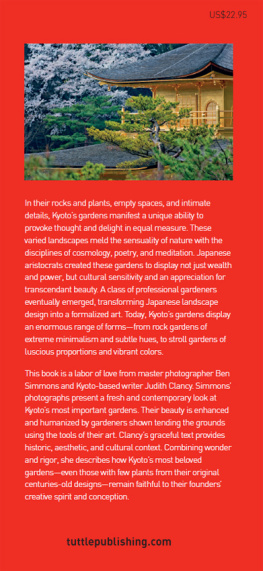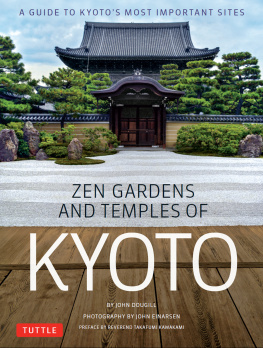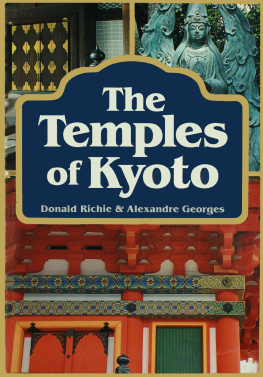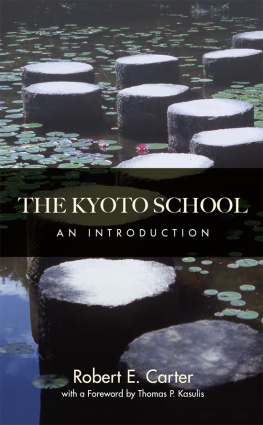Contents
Alex Kerr
with Kathy Arlyn Sokol
ANOTHER KYOTO
PENGUIN BOOKS
UK | USA | Canada | Ireland | Australia
India | New Zealand | South Africa
Penguin Books is part of the Penguin Random House group of companies whose addresses can be found at global.penguinrandomhouse.com.
First published in Japan by Sekaibunka Publishing Inc. 2016
First published in Great Britain by Penguin Books 2018
Copyright Alex Kerr and Kathy Arlyn Sokol, 2016
The moral rights of the authors have been asserted
Illustrations by Tetsuji Fujihara
ISBN: 978-0-141-98834-4
THE BEGINNING
Let the conversation begin
Follow the Penguin Twitter.com@penguinUKbooks
Keep up-to-date with all our stories YouTube.com/penguinbooks
Pin Penguin Books to your Pinterest
Like Penguin Books on Facebook.com/penguinbooks
Listen to Penguin at SoundCloud.com/penguin-books
Find out more about the author and
discover more stories like this at Penguin.co.uk
PENGUIN BOOKS
ANOTHER KYOTO
Alex Kerr is an American writer, antiques collector and Japanologist. Lost Japan is his most famous work. He was the first foreigner to be awarded the Shincho Gakugei Literature Prize for the best work of non-fiction published in Japan.
Kathy Arlyn Sokol is a non-fiction author, interviewer and Emmy award-winning narrator who has spent over thirty years living in Kyoto. Her book Rasta Time, on Bob Marleys life and legacy, will soon be released in English.
Foreword
When I studied Chinese classics at Oxford, at the end of each term there was a terrifying event, called Handshaking. Dressed in a medieval black frock, each student in turn would be ushered into a room lined with oil paintings, in which he found his professor along with the Master of the College, and some other dons seated at the end of a long oak table. You sat at one end of the table, the dons sat at the other, and they talked about you. Not always flatteringly.
Fresh from 1960s liberated America, I was badly equipped to handle the British dry approach to study. In Japan Id been imbued with Zen and old thatched farmhouses, which fit poorly with the academic fine points I was supposed to be learning. My tutors viewed me as a Japan-influenced hippy. The low point came when I was asked to write an essay on Chinas ancient book of divination, the I Ching. I discussed its historical background, the philology of the unusual characters found in its text, what later commentators had said about itall the stuff that had been assigned in my tutorial. At the end of the essay, I wrote, But this is just background. The main thing about the I Ching is that it works.
That was the last straw. When I walked into Handshaking at the end of that term, I saw grim faces at the end of the table. One of my tutors had written a letter to the dons, which was read aloud. It went on for some time. The concluding words were: Mr. Kerr is your typical American. He lacks academic rigor. He researches only the ephemera that draw his interest; hes quick to latch on to superstitions, myths, and oddities. He waves these peculiar interpretations around as if they were sparklers. His tales are not scholarship, and they are not to be given credit, all his protestations notwithstanding.
I say this in the name of proper disclosure, because this book follows more or less in the vein of that ill-fated I Ching essay. The inspiration to write it came from fellow writer and longtime Kyoto resident Kathy Arlyn Sokol, with whom Ive often gone on temple-viewing outings. One day Kathy commented, I wish we had a record of the things you say as we walk through these temples. I think our conversations should be shared with others. So we decided to create a book that wouldnt be written, but rather spoken. We sat down with a recorder, and over several years, I would talk and Kathy recorded and transcribed. She sent edited transcripts to me and I used these as the base for an expanded text, which Kathy edited again. Back and forth it went, until finally we completed these nine essays. While theyve been rewritten and revised, weve tried to keep the tone closer to speech than to writing.
Ive lived in Kyoto for decades, but what brought me to Kyoto was a coincidence. It was not that I had set my heart on being here. When I was quite young my family moved to Yokohama in 1964. I went to school there and later attended university in Tokyovery far from Kyoto and Kansai. While in university, I discovered Iya Valley in Shikoku and later bought an old thatched farmhouse in the Iya mountains, a house that became my passion. I used to commute between Tokyo and Iya, with Kyoto being just a place I passed through on the way.
I dont think I would ever have come to live in Kyoto except that I met art collector David Kidd, who became my mentor. David, who had lived in a Ming palace in Beijing before coming to Japan in the early 1950s, was a connoisseur and a great wit. Hes much quoted in this book. In 1976, David founded a program of traditional arts at Oomoto Foundation, located in Kameoka, a town at the western edge of Kyoto, and he asked me to come and help out with the Oomoto school. Without realizing what I was getting into, I obeyed David, came to Oomoto, and had a life-changing discovery of Tea ceremony, Noh drama, martial arts, and so on. A year later, after graduating university, I took a job at Oomotos International Department. In 1977 I moved into an old house in Kameokaand Ive been here ever since.
Living just outside of Kyoto, I found myself regularly going into the city. In those days it was a different place from Kyoto today. There were many beautiful old houses still standing. The temples hadnt been polished to the state in which we see them now. They were dingier, darker, but there were fewer rules about what rooms you could enter and whether you could take a photo or not. You could get up close to an old ink painting hung in a murky tokonoma alcove that turned out to be a masterpiece, or push open a door along a corridor and find a secret garden beyond it.
Kyoto is very much on the world tourism route, so I always had a lot of visitors. Anyone who lives here finds that they are constantly taking guests to visit temples. Since I had to do these tours so often, I came up with a Three-to-One policy. Each time visiting friends and I went out, we would go to the three famous places they wanted to see, and then to one place that I wanted to see. It might be a minor temple Id read about somewhere, or a little-visited back garden within the grounds of a famous place. Discoveries could be found just a few steps off the well-beaten tourist path.
Three-to-One was a way to relieve the monotony of always traipsing to see the same clichd sites. Yet repeatedly brought back to these sites for the sake of my visitors, I learned that theres an off-the-beaten path way to look at even the most famous landmarks. Standing yet again at tourist-clogged Kiyomizu or Kinkakuji, in my boredom Id look away from where Id always looked before, and I would notice something; like the little roofs sheltering the ends of all the wooden crossbeams sticking out from the framework beneath Kiyomizus verandah. That made me think about roofs. And suddenly the familiar old place looked new.

